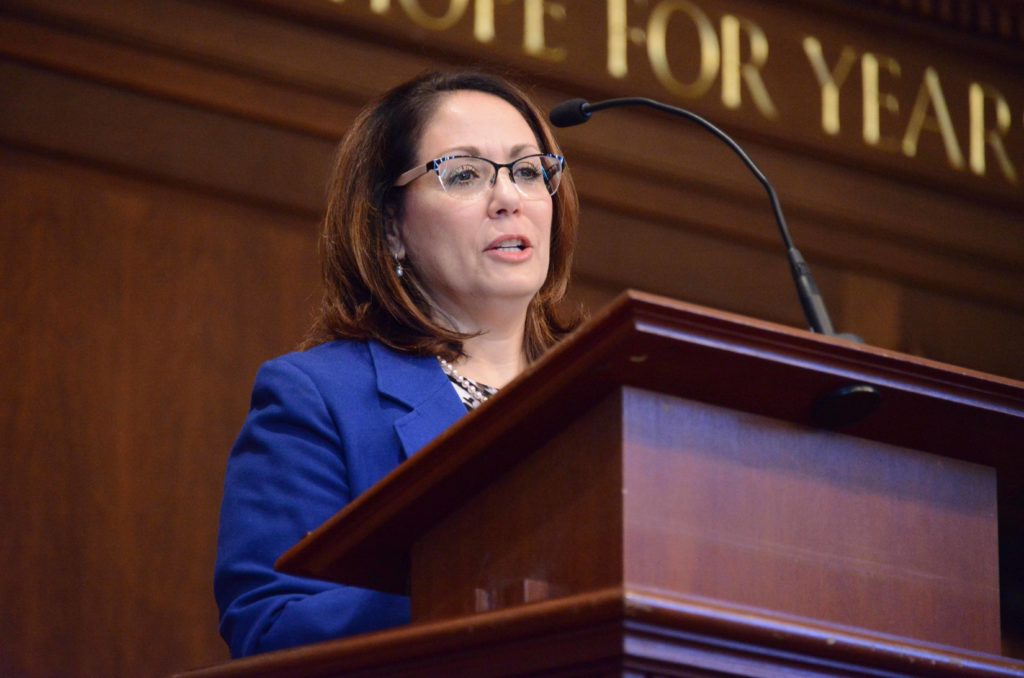Dr. Vanessa Calderón-Rosado on the Benefits of Gratitude
For fifteen years, Roxbury Latin has begun the last school day before the Thanksgiving break with a tradition that is distinctly RL. Thanksgiving Exercises are an opportunity to, as Headmaster Brennan said, “turn our heads and hearts to the proposition of gratitude—for the country in which we live, for the freedoms and opportunities that are guaranteed by our being Americans, for our families and friends, for this community and others, for intelligence and discernment and deep feeling. For our gifts and aspirations, for good sense and hoped-for-dreams. Indeed we should live with an attitude of gratitude.”
During Hall students, faculty, and guests sang with gusto—We Gather Together, For the Splendor of Creation, America the Beautiful. Mr. McLaren read Psalm 100, and senior Ian Balaguera read Harvest Hymn by John Critchley Prince. The Hall featured the resonant Litany of Thanksgiving—which includes a boy from each of the six classes—reminding us all of our “blessings manifold.” “The only thing wrong with Thanksgiving as a holiday,” Mr. Brennan asserted, “is that it may suggest that this is the only time to give thanks, or at least the most important. Each day, virtually each hour, offers an occasion for gratitude.”
Delivering the morning’s Hall address was Dr. Vanessa Calderón-Rosado, CEO of Inquilinos Boricuas en Acción (IBA)—a community development corporation that helps individuals and families improve their lives through high-quality affordable housing, education, and arts programs. Under Dr. Calderón-Rosado’s leadership since 2003, IBA has become the largest Latino-led nonprofit organization in Greater Boston.
“According to Cicero, gratitude is more than the greatest virtue—it is the mother of all other remaining virtues,” said Dr. Calderón-Rosado. “Studies have shown that gratitude may be associated with many benefits, including better physical health, better mental health, increased happiness, increased life satisfaction, and decreased materialism. Other studies seem to validate Cicero’s observations. They suggest that gratitude as a virtue encourages the development of other virtues such as patience, humility, and wisdom… Being grateful requires a conscious and deliberate effort to pause and recognize the goodness inside us and around us. It takes developing an understanding of our human and social condition.”
Dr. Calderón-Rosado described her experience growing up in a loving home in San Juan, Puerto Rico, with her mother, father and brother. She recalled the nightly prayers she and her mother would say together. “It was mostly led by her and repeated by me, but those prayers, I realized, were our act of thanksgiving. We gave thanks for the sun, for nature, for being alive, for breathing, for our ability to see the colors of the flowers, for our ability to hear the birds singing. We gave thanks for our ability to walk, run, play, eat, sleep. For the roof above our heads, for the cars that took us to and from school and work every day. We gave thanks for my teachers, for the food on our table. My mom and I gave thanks for our family, for their health, and for ours, and for our beating hearts. It was a long list, but at the end of our prayers each night, she and I felt happy. We looked at each other with love, with a smile, and she kissed me. And before she left my room, she said Dios te bendiga, mi hija. God bless you, my daughter. I remember the feeling of joy that being thankful produced in me before closing my eyes to sleep.”
During Hall, Dr. Calderón-Rosado called upon a boy from each class to share aloud something he was thankful far—something that started with the same letter as his first name: Mark (VI) was grateful for his mom; Vishnu (III) for vegetables; Daniel (II) for dance; and Evan (I) for “everyone here!”
Dr. Calderón-Rosado was selected as a Barr Fellow in 2009, and in 2010 she became the first Latina ever to be appointed to the Massachusetts Board of Elementary and Secondary Education. In 2014, she was appointed to the City of Boston’s Housing Task Force and Women’s Commission. She has served as advisor to numerous other task forces, commissions, and high-profile executive searches, including those for Boston’s Police Department and Public Health Commission. Born and raised in Puerto Rico, Dr. Calderón-Rosado earned her bachelor’s degree from the University of Puerto Rico and her doctorate in public policy from UMass Boston. She is the mother of Carlos ‘16, and Antonio, Class I.

